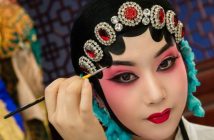
In recent years, there has been an explosion of attention directed at bodies. There remains a pressure to maintain a certain body weight and aesthetic. While aesthetic ideals vary from culture to culture, the pressure to be beautiful is fierce for everyone. We asked four students at Dulwich College Beijing to provide insight into the pressure their generation feels to look a certain way and where those demands come from.
Is there such thing as an ideal body?
Anna-Sophie: A lot of teenagers think there is because of the media. What people here in Beijing perceive as an ideal body or what is beautiful is completely different to Europe.
Pratcha: I think it’s always changing. If we imagine 70 years ago, the image of the perfect man would be a soldier, short military hair, big guy. But now, guys are portrayed in the media as more feminine, [they use]more beauty and hair products.
Kyoka: I think there always is [an ideal]for the time or the place that you are. I think media [plays]a big part.
Sam: Movies and TV shows generally cast beautiful people. So the more often they do that the more often I think, “Oh, that person’s beautiful,” because that’s the way I’ve been brought up.
Where else does the idea of an ideal body come from?
Kyoka: I heard that in India, married women were expected to be bigger because it shows that they are rich and well-fed.
Pratcha: In Thailand, especially for women, if you have tan skin you’re considered low-class, because you’re seen to spend more time outside working. In the Western world, if you have pale skin that means you don’t have time to go on vacation and get a tan. In Thailand, there are a lot of advertisements for products to make the skin fairer.
Anna-Sophie: Beauty is perceived differently between race and culture. It also depends on how you’re brought up. I’ve always been told, “Don’t think too much about what other people think, because that’s just not important.”
Sam: In Year 8, we did a section on body image. They were trying to promote having confidence in your own body, and I think the way the school does that changes the way people feel about their body.
Do teenagers feel pressure to conform to a body ideal?
Kyoka: I think there is more pressure for teenagers than for some adults. Some of it has to do with peer pressure and people our age can be more easily influenced by media.
Anna-Sophie: When you’re an adult, you know who you are, you’re leading your own life. Right now, we’re still building this pathway to where we’re going. We’ve been brought up internationally so we’ve seen all kinds of people. We might be confused about what the ideal body is, because we have so many different opinions floating around in our head.
Sam: I‘ve found internationally that people care less about [body image and peer pressure], whereas in New Zealand people cared a lot and bullying really affected people.
Pratcha: It depends on the environment. Dulwich is an environment that’s really safe, and the fact that we have uniforms takes away that ridicule of people wearing what some might consider cool clothes or not-so-cool clothes.
How do you think body image and pressure differs for men and women?
Sam: When girls are younger, they play with dolls, and they get that image of the perfect woman from that. Whereas if I played with toy trucks, I can’t aspire to be a truck. But girls can be Barbie. I feel like girls want to be beautiful. But now, guys really care about their clothes, and their hair; it just seems like they care about everything now.
Is it hard to keep pace with that?
Sam: It’s an ongoing battle. I think soon it will be completely equal between the two genders.
Pratcha: I do feel the pressure sometimes to get to this perfect body. I think for men it’s more about physical stuff, even though now it’s changing.
Do you think it’s physical for women too?
Pratcha: In a different way. For models, you see some who [are]unhealthily skinny, and some girls might want to be like that.
Kyoka: In Japan, you’re a good person if you’re similar to the people around you. People of the same age group usually have the same clothes or makeup. That really influences when they decide to start to dress in a certain way or put on certain types of makeup.
In what ways does body image vary for China and your country of origin?
Anna-Sophie: At a more superficial level, I think the whole idea of body image is less extreme here than in Germany. In Germany, it’s so evident that they’re different in the sense that they use hair dye, cream, makeup; they take a lot more risks.
Sam: In Melbourne, the fact that you are different is celebrated.
Kyoka: In Japan, people try to stay white and my parents tell me to not get tanned because they think it’s not acceptable. But I come here and my friends are like “Look at this tan that I’ve managed to achieve!” I started trying not to care about either way, because it is a bit confusing.
Are people judged by their bodies?
Anna-Sophie: I think so. It has to do with first impressions. I think it’s the easiest way of judgment, but not necessarily the correct one.
Sam: I think people try to say “I don’t judge people by how they look,” but they do.
Pratcha: There’s no way around it, it’s the visual that you see first. But I don’t think that should get in the way of you trying to get to know who they really are.
Kyoka: When I was smaller, the judgment was just simple judgment. You look at one person and think they are pretty or handsome, but I feel like we’re able to differentiate more now; we know that what we see is only what we see.



